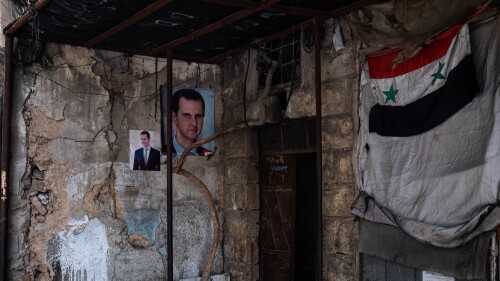When I suggest that radical Muslims are the problem and that moderate Muslims are the solution, the nearly inevitable retort from most people is: “What moderate Muslims?”
“Where are the anti-Islamists’ demonstrations against terror?” they ask me. “What are they doing to combat Islamists? What have they done to reassess Islamic law?”
My response: Moderate Muslims do exist. But, of course, they constitute a very small movement when compared to the Islamist onslaught. This means that the American government and other powerful institutions should give priority to locating, meeting with, funding, forwarding, empowering, and celebrating those brave Muslims who, at personal risk, stand up and confront the totalitarians.
A just-published study from the RAND Corporation, Building Moderate Muslim Networks, methodically takes up and thinks through this concept. Angel Rabasa, Cheryl Benard, Lowell Schwartz, and Peter Sickle grapple intelligently with the innovative issue of helping moderate Muslims to grow and prosper.
They start with the argument that “structural reasons play a large part” in the rise of radical and dogmatic interpretations of Islam in recent years. One of those reasons is that over the last three decades, the Saudi government has generously funded the export of the Wahhabi version of Islam. Saudi efforts have promoted “the growth of religious extremism throughout the Muslim world,” permitting the Islamists to develop powerful intellectual, political, and other networks. “This asymmetry in organization and resources explains why radicals, a small minority in almost all Muslim countries, have influence disproportionate to their numbers.”
The study posits a key role for Western countries here: “Moderates will not be able to successfully challenge radicals until the playing field is leveled, which the West can help accomplish by promoting the creation of moderate Muslim networks.”
If this sounds familiar, perhaps it is because of a similar scenario in the late 1940s, when Soviet-backed organizations threatened Europe. The four authors provide a helpful potted history of American network-building in the early Cold War years — in part to show that such an effort can succeed against a totalitarian enemy, in part to suggest ideas for tackling contemporary problems. (One example — “a left hook to the Kremlin is the best blow” — implies that Muslims can most effectively overcome Islamism.)
The authors review American efforts to fight Islamism and find these lacking, especially with regard to strengthening moderates. Washington, they write, “does not have a consistent view on who the moderates are, where the opportunities for building networks among them lie, and how best to build the networks.”
NED chief Carl Gershman | |
They are only too right. The American government has a disastrously poor record in this regard, with an embarrassing history of accepting twin delusions: on the one hand, thinking Islamists are moderates, and on the other hand, hoping to win them over. Such government figures as FBI director Robert Mueller, State Department undersecretary Karen Hughes, and National Endowment for Democracy chief Carl Gershman wrong-headedly insist on consorting with the enemy. Instead, the RAND study promotes four partners: secularists, liberal Muslims, moderate traditionalists, and some Sufis. It particularly emphasizes the “emerging transnational network of laicist and secularist individuals, groups, and movements,” and correctly urges cooperation with these neglected friends.
In contrast, the study proposes de-emphasizing the Middle East, and particularly the Arab world. Because this area “offers less fertile ground for moderate network and institution building than other regions of the Muslim world,” it urges Western governments to focus on Muslims in Southeast Asia, the Balkans, and in the Western diaspora, and to help make their ideas available in Arabic. This novel stratagem defies a centuries-old pattern of influence emanating from the Middle East, but it is well worth a try.
Even the generally hardheaded RAND study sometimes lets down its guard. Dismayingly, the quartet refrains from condemning Washington for holding talks with lawful Islamists even as it cautiously endorses European governments treating some Islamists as partners. It mistakenly characterizes the American-based Progressive Muslim Union as promoting secular Islam, when it was really another Islamist organization - but with a hip tone. (No other Islamists dared host a feature called “Sex and the Umma.”)
Although Building Moderate Muslim Networks is not the final word on the subject, it marks a major step toward the systematic reconfiguration of Washington’s policy for combating Islamism. The study’s meaty contents, clear analysis, and bold recommendations usefully move the debate forward, offering precisely the in-depth strategizing that Westerners urgently need.
Mr. Pipes, who is the director of the Middle East Forum, resumes his column this week after taking time off to teach a course titled “Islam and Politics” at Pepperdine University.
Apr. 18, 2007 update: A number of prominent Islamists have responded to the RAND study at IslamOnline.net, including Jamal Badawi, Louay M. Safi, and Taha Jaber Al-'Alwany. Unsurprisingly, they are less than delighted with it.
Apr. 19, 2007 update: Two massive anti-Islamist demonstrations in Turkey and Pakistan suggest that moderates may be finding their voices, a Washington Times article on the subject today suggests:
In Karachi, Pakistan’s largest city, an estimated 100,000 people took to the streets Sunday[, Apr. 15] to protest plans by an influential mosque to run a “Taliban-style” anti-vice campaign in the capital city of Islamabad. A day earlier, some 500,000 Turks staged a rally in Ankara urging Prime Minister Recep Tayyip Erdogan, a former Islamist and head of the moderate Muslim ruling party, not to run for president, traditionally a secular and nonpartisan post. ...









